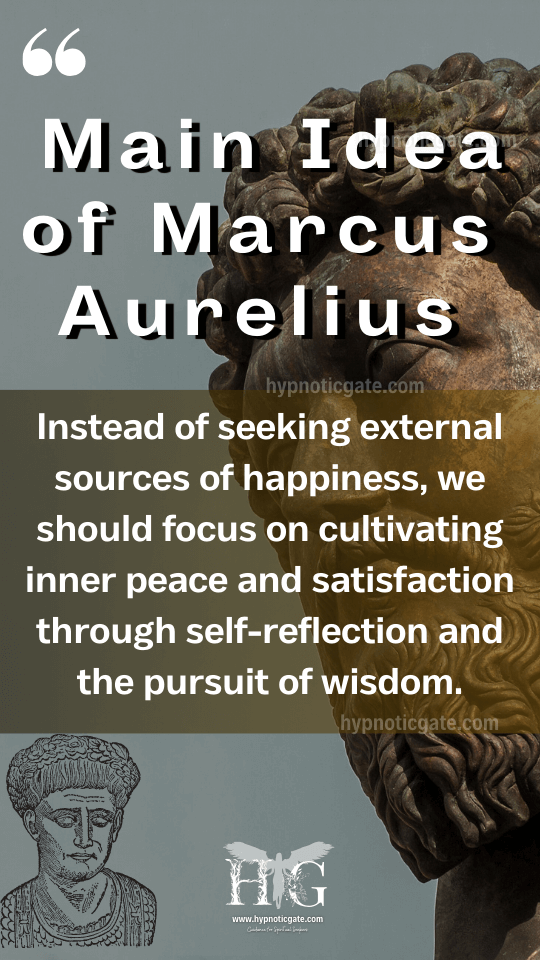
Hello and welcome, Hypnoticgate.com fans! Have you ever wondered what the famous philosopher and Roman soldier Marcus Aurelius had to say about living an enjoyable life? If so, you’re in luck since we’ll discuss the critical focus and message of his well-known book, Meditations, in this blog.
Marcus Aurelius is regarded as one of the greatest Stoic thinkers of all time, and his Meditations are a timeless masterpiece that provides wisdom and direction on how to lead a happy life. Aurelius examines the value of virtue, introspection, and acceptance of the transience of all things in this book. His message is clear: we should concentrate on the factors under our control, develop our inner selves, and embrace the certainty of suffering and change.
Hence, the message of Meditations is just as applicable now as it was when it was written approximately 2,000 years ago, whether you’re a philosophy student, a seeker of wisdom, or simply searching for direction on how to live a better life. Let’s look at this timeless message together as we plunge in!
“Very little is needed to make a happy life; it is all within yourself, in your way of thinking.”
– Marcus Aurelius
The Main Idea/Message of Meditations

The core of Meditations is the powerful message that we should strive to live a virtuous life and accept the inevitable changes and difficulties that come with it. Instead of seeking external sources of happiness, we should focus on cultivating inner peace and satisfaction through self-reflection and the pursuit of wisdom.
Throughout the book, Marcus Aurelius emphasizes the importance of living according to our values and principles, even in adversity. He urges readers to recognize everything as impermanent and avoid becoming attached to fleeting pleasures or material possessions. The message in Meditations is as relevant today as it was around 2000 years ago, whether you’re a philosophy student, a seeker of wisdom, or simply looking for direction on how to live a better life. Let’s explore this timeless lesson together as we delve into the book!
What Was the Primary Goal of Marcus Aurelius in Writing Meditations?
Marcus Aurelius wrote Meditations to reflect on his experiences and develop principles for living a virtuous and fulfilling life. He aimed to inspire readers to cultivate self-discipline, rationality, and gratitude and to navigate life’s challenges with reason and moral virtue, ultimately achieving inner peace and personal growth.
In addition to these themes, Meditations also highlights self-reflection’s important role in achieving a sense of inner peace and clarity. By examining our thoughts and emotions, we can better understand ourselves and the world around us, and make choices that align with our values and goals.
Meditations’s central idea/message is a call to live a life of virtue, wisdom, and acceptance. By focusing on inner peace and cultivating a sense of contentment, we can navigate life’s challenges with grace and dignity.
“Our life is what our thoughts make it.”
– Marcus Aurelius
What Are Some Famous Quotes by Marcus Aurelius, and What Do They Mean?

Here are some quotes by Marcus Aurelius, along with simple explanations of their meanings:
- “You have power over your mind – not outside events. Realize this, and you will find strength.” – Focus on what you can control, not what you can’t.
- “The happiness of your life depends upon the quality of your thoughts.” – Your thoughts shape your life experience.
- “The soul becomes dyed with the color of its thoughts.” – Your thoughts and beliefs shape your character and inner being.
- “The universe is change; our life is what our thoughts make it.” – Embrace change and focus on cultivating a positive mindset.
- “The object of life is not to be on the side of the majority, but to escape finding oneself in the ranks of the insane.” – Be true to yourself, even if it means going against the norm.
- “Very little is needed to make a happy life; it is all within yourself, in your way of thinking.” – Happiness comes from within, not external factors.
- “The art of living is more like wrestling than dancing.” – Life is full of challenges, and it takes effort and resilience to overcome them.
- “A man’s worth is no greater than his ambitions.” – Your value lies in what you strive for and accomplish in life.
- “Dwell on the beauty of life. Watch the stars, and see yourself running with them.” – Focus on the positive aspects of life and find joy in the simple pleasures.
- “The whole future lies in uncertainty: live immediately.” – Don’t waste time worrying about what might happen in the future; focus on the present and make the most of it.
How Can We Apply the Lessons and Insights From Meditations to Our Modern Lives?
Meditations emphasize the value of cultivating inner calm and pleasure. In our fast-paced and frequently stressful modern society, Marcus Aurelius’ Meditations has remained relevant for over two thousand years because it offers timeless wisdom that we can apply to our modern lives. In this post, we will explore how we can apply the lessons and insights from Meditations to live a more fulfilling life in the present day.
“The soul becomes dyed with the color of its thoughts.”
– Marcus Aurelius
- Cultivate inner peace and contentment by practicing mindfulness meditation or journaling to reflect on our thoughts and emotions.
- We live by our values by identifying our values and making a conscious effort to align our actions with them.
- Embrace change by letting go of our attachment to things being a certain way and approaching change with curiosity and an open mind.
- Practice gratitude by reflecting on the things we are grateful for each day.
- Develop resilience by cultivating a growth mindset and practicing self-compassion when faced with challenges.
By incorporating these lessons from Meditations into our lives, we can live a more fulfilling, purposeful, and resilient life in today’s fast-paced world.
Marcus Aurelius strongly endorses the idea that humans are inherently social creatures. In this context, he doesn’t just see social interaction as a choice and an ethical duty. It’s not merely about getting along with others; it’s about actively engaging in the community for the greater good.
His philosophy urges us to treat everyone justly and fairly, as we’re all part of this larger social fabric. Shunning this duty is akin to denying our human nature. So, if you’re wondering whether to engage or isolate, Marcus Aurelius makes it clear: lean into your social obligations and responsibilities. That’s how you fulfill your role in the grand scheme of life.
How Does Marcus Aurelius Approach the Concept of Happiness?
So what’s Marcus Aurelius’ secret sauce for happiness? He tells us that our thoughts and actions are the key to a fulfilling life. It’s not about what happens to us but how we react to it. For Aurelius, life’s joy comes from living virtuously and reasoning.
Got a setback? Don’t sweat it! Instead, focus on how you can turn it into an opportunity for growth. For Aurelius, it’s this active pursuit of virtue that leads us to true happiness, known in Stoic terms as eudaimonia. So, if you’re pursuing happiness, consider ditching the external fixes. Look inward and fine-tune your character. Why? That’s where real, enduring happiness stems from.
Does Science Back Up What Marcus Aurelius Said About Happiness?
Take cognitive behavioral therapy (CBT), for example. This modern psychological treatment aligns quite well with Aurelius’ age-old wisdom. CBT teaches us to identify and challenge our cognitive distortions or faulty ways of thinking, similar to how Aurelius advocates for rational thought as a path to happiness.
In CBT, the idea is that our thoughts, feelings, and behaviors are interconnected. If you can manage your thoughts, you can better manage your emotions and actions, leading to a happier life. The concept resembles Aurelius’ idea that the “quality of your thoughts” dictates your happiness.
Essentially, what Aurelius preached thousands of years ago is scientifically supported. Your thought patterns indeed play a critical role in your emotional well-being. So yes, science gives a nod to Aurelius’ philosophy! Want to be happy? Start by tuning into your thoughts.
What is the central theme of “Meditations” by Marcus Aurelius?
The central theme is Stoicism, focusing on self-discipline, personal ethics, and rationality.
How does Marcus Aurelius suggest we handle adversity?
He advises facing challenges with calm rationality and viewing adversity as a chance for growth.
What is Marcus Aurelius’ view on death?
He sees death as a natural part of life and urges us to accept it without fear.
“You have power over your mind – not outside events. Realize this, and you will find strength.
– Marcus Aurelius
Gratitude is A crucial part of Stoicism.
While gratitude is not necessarily the main focus of Stoicism, it is undoubtedly an essential aspect of this philosophical tradition. Stoicism teaches us to focus on what we can control and accept what we cannot, which includes cultivating a mindset of gratitude for the things we have in our lives.
“The object of life is not to be on the side of the majority, but to escape finding oneself in the ranks of the insane.”
– Marcus Aurelius
By practicing gratitude, we can shift our focus away from what we lack and appreciate the abundance already in our lives. This can help us find contentment and peace in the present moment, rather than constantly chasing after external sources of happiness.
Gratitude can also help us develop a sense of perspective, another key tenet of Stoicism. By recognizing the impermanence of all things and appreciating the present moment, we can better understand the world around us and our place in it.
While gratitude may not be the sole focus of Stoicism, it is undoubtedly an essential aspect of this philosophy that can help us live a more fulfilling and contented life.
The happiness of your life depends upon the quality of your thoughts.”
– Marcus Aurelius
How Does the Message of Meditations Compare to Other Ancient Greek and Roman Philosophies?
The message of Meditations, written by the Stoic philosopher Marcus Aurelius, shares many similarities with other ancient Greek and Roman philosophies and contains unique insights and perspectives. Here are some ways in which the message of Meditations compares to other ancient philosophies:
- Similarities with Stoicism: As a Stoic philosopher, Marcus Aurelius’ message in Meditations aligns closely with the tenets of Stoicism. These include the importance of self-control, the pursuit of wisdom, and the acceptance of the inevitability of change and hardship.
- Similarities with Epicureanism: Despite being seen as a rival to Stoicism, Epicureanism shares some similarities with Meditations. Both emphasize the importance of inner peace and contentment and encourage individuals to avoid external sources of happiness and pleasure.
- Differences with Cynicism: While Cynicism and Stoicism share some commonalities, such as the importance of living by nature, there are significant differences between the two. Meditations, for example, emphasize the importance of rational thought and self-reflection, while Cynicism often eschews intellectual pursuits in favor of a more instinctual way of living.
- Differences with Platonism: Unlike Platonic philosophy, which emphasizes the existence of abstract and ideal forms, Meditations focuses on living by one’s values and principles in the present moment. This emphasis on practical living aligns more closely with Stoicism than with Platonism.
- Unique insights: While Meditations shares similarities with other ancient philosophies, it also contains unique insights and perspectives. For example, Marcus Aurelius emphasizes recognizing the impermanence of all things and the value of self-reflection in achieving inner peace.
Ultimately, Meditations’ message may be understood as a part of a broader history of philosophy, yet it additionally contains original and valuable ideas that remain to connect with modern readers.
“The universe is change; our life is what our thoughts make it.” –
– Marcus Aurelius
Other Articles:

